|
|
|
Sort Order |
|
|
|
Items / Page
|
|
|
|
|
|
|
| Srl | Item |
| 1 |
ID:
167951
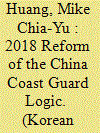

|
|
|
|
|
| Summary/Abstract |
In June 2018, the Chinese government initiated a new round of reforms to reshuffle
the leadership of the China Coast Guard (CCG) so as to better administer the
country’s blue territory. In contrast to the 2013 structural reform of the Chinese
government which created the CCG and made it part of the State Oceanic
Administration, a sub-ministerial organ of the Chinese State Council, the 2018
reform placed the agency under direct command of the Communist Party’s Central
Military Commission. This paper argues that the CCG today has been a formidable
maritime giant and acquired a fair ability to coordinate its patrol operations with
other agencies in recent years. In particular, the maritime law enforcement force
has been made more militarized given its close association with the Chinese
Navy. Nonetheless, despite the notable performance the CCG has made, it still
faces problems of unclear legal status and weak airborne surveillance capabilities,
keeping its institutional reform far from full completion. Moreover, a more
powerful coast guard force can on the one hand facilitate Beijing’s aim to become
a great maritime power but on the other hand lead to more security challenges as a
harsher maritime contest between China and its strategic competitors is likely to be
witnessed in the near future.
|
|
|
|
|
|
|
|
|
|
|
|
|
|
|
|
| 2 |
ID:
108758
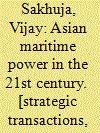

|
|
|
|
|
| Publication |
New Delhi, Pentagon Press, 2011.
|
| Description |
xv, 363p.
|
| Standard Number |
9788182745933
|
|
|
|
|
|
|
|
|
|
|
|
Copies: C:1/I:0,R:0,Q:0
Circulation
| Accession# | Call# | Current Location | Status | Policy | Location |
| 056361 | 359.0095/SAK 056361 | Main | On Shelf | General | |
|
|
|
|
| 3 |
ID:
146472
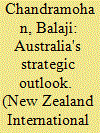

|
|
|
| 4 |
ID:
130651
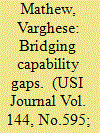

|
|
|
| 5 |
ID:
148534
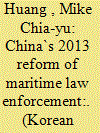

|
|
|
|
|
| Summary/Abstract |
Since late 2012, Chinese President Xi Jinping has introduced far-ranging measures to “build China into a maritime power (建設海洋强國).” One notable campaign was the creation of a centralized China Coast Guard (CCG) force and the National Oceanic Commission (NOC), as the previous lack of a functional mechanism to coordinate China`s maritime policies and five maritime law enforcement agencies, the “five dragons,” has been a longstanding problem hindering the country from effectively administering its maritime territories. This paper argues that the operational functions of the CCG have been developed, although not fully, and CCG vessels are now undertaking patrol missions in an orderly pattern. Nevertheless, at the policymaking level, the progress of the reform is rather limited. Particularly, the development of the NOC, an organ responsible for the “top-level design” of China`s grand maritime strategy, as well as the legal foundations for the CCG`s operations are still incomplete. Moreover, Beijing`s decision not to incorporate the Maritime Safety Administration into the CCG suggests that the country is adopting an old logic of “crossing the river by feeling the stones (摸着石頭過河)” while still pledging to reach its maritime power goal, part of the Chinese dream for national rejuvenation.
|
|
|
|
|
|
|
|
|
|
|
|
|
|
|
|
| 6 |
ID:
190489
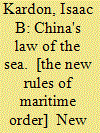

|
|
|
|
|
| Publication |
New Haven, Yale University Press, 2023.
|
| Description |
xiv, 398p.hbk
|
| Standard Number |
9780300256475
|
|
|
|
|
|
|
|
|
|
|
|
Copies: C:1/I:0,R:0,Q:0
Circulation
| Accession# | Call# | Current Location | Status | Policy | Location |
| 060357 | 341.45/KAR 060357 | Main | On Shelf | General | |
|
|
|
|
| 7 |
ID:
133060
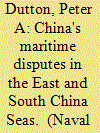

|
|
|
|
|
| Publication |
2014.
|
| Summary/Abstract |
China pursues its security through interior strategies that involve the development of rings of security around central areas of national interest. The Chinese have long felt vulnerable from the sea, and their current maritime strategy seeks to reduce that vulnerability by extending a ring of maritime control around China's periphery. China pursues this control through a combination of forcestructure development and legal assertions. Tensions arise because China's strategy conflicts with the territorial claims, resource interests, and security concerns of other states in East Asia. China's strategy also causes friction with the United States, which relies on freedom of navigation in maritime East Asia for American security interests and which must reassure regional allies and partners that American security guarantees are meaningful. In order to ensure the position of the United States in East Asia, American policies must focus on maintaining the region as an open, maritime system. This requires continuous development of technological advantages to ensure that the center of power in Asia does not migrate from the maritime domain to the continent. It also requires the United States to support the ability of allies, friends, and partners to resist China's nonmilitarized coercion, as well as to reinforce the normative structure that supports the efficacy of maritime power in the region and around the globe.
|
|
|
|
|
|
|
|
|
|
|
|
|
|
|
|
| 8 |
ID:
134050
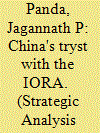

|
|
|
|
|
| Publication |
2014.
|
| Summary/Abstract |
Engaging with a multilateral body requires constructive foreign policy forethought, especially for a country that is not a fully fledged member of that body. China's overtures to the Indian Ocean Rim Association (IORA) exemplify this approach. The Indian Ocean and India are the two most immediate elements in China's policy approach to the IORA. With 20 member states, extra-territorial major powers as important dialogue partners, and the increasing importance of energy politics in the region, the IORA today is a significant multilateral body in China's calculus. Beijing's involvement with the IORA bespeaks the construct and strategy of a great power. For India, China's power construct in this matter poses three challenges: Beijing as a maritime power; Beijing as an economic power; and Beijing as a polygonal power.
|
|
|
|
|
|
|
|
|
|
|
|
|
|
|
|
| 9 |
ID:
133389
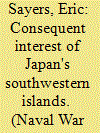

|
|
|
|
|
| Publication |
2014.
|
| Summary/Abstract |
In his classic collection of essays on maritime geography The Interest of America in Sea Power, Present and Future, Alfred Thayer Mahan opined that the importance of "portions of the earth's surface, and their consequent interest to mankind, differ from time to time."1 Just as the Mediterranean Sea once transfixed the minds of European strategists and policy makers, Mahan believed, at the turn of the twentieth century, the Gulf of Mexico and Caribbean Sea would obtain similar prominence in American strategic thinking. A century later, as we observe the relative balance of economic and military powers shifting to Asia and the Pacific and Indian Oceans, Mahan's teachings on geography are again instructive, as once seemingly insignificant bodies of water and island chains take on a new importance in regional security matters.
|
|
|
|
|
|
|
|
|
|
|
|
|
|
|
|
| 10 |
ID:
133068
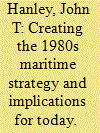

|
|
|
|
|
| Publication |
2014.
|
| Summary/Abstract |
While important differences exist, the first decade of the twenty-first century paralleled the 1970s for the Department of Defense and the U.S. Navy. U.S. armed forces were embroiled in extended and expensive counterinsurgency wars. American military equipment was growing old, budgets were tight, and extended projections called for significant decreases in the nation's armed forces, just as the main prospective military adversary was both rapidly modernizing and expanding its forces, particularly its navy. "From 1962 to 1972, the navy had programmed the construction of 42 ships per year, but between 1968 and 1975 only 12 ships, or less than a third as many per year, were programmed. In 1975, given the age of ships already at sea, and the navy-expected service life for a warship of 25-30 years, the service anticipated retiring about 4 percent of the active fleet each year."1 The Soviets were extending their defensive perimeter from two to three thousand kilometers.2 Today, the Chinese suggest extending their defensive perimeter from the "first island chain," enclosing the East and South China Seas, to the second, bounded by the Marianas, three thousand kilometers from the Chinese coast.3 In the 1970s, the United States questioned its own ability to fight forward, defend allies, and achieve objectives -as many defense analysts and many in the Navy do now.
|
|
|
|
|
|
|
|
|
|
|
|
|
|
|
|
| 11 |
ID:
133071


|
|
|
|
|
| Publication |
2014.
|
| Summary/Abstract |
It has been well over a decade since the first “prophets” of information warfare proclaimed a new age of conflict fought not just on air, sea, and land but with electrons in what came to be known as “cyberspace.”1 Since these early predictions, many incidents have confirmed that criminals, random hackers, and government-sanctioned specialists can wreak havoc on governments, military communications systems, and corporations. The Stuxnet worm alone helped delay-by months, perhaps years-the long-standing efforts of Iran to acquire sufficient nuclear material to build nuclear weapons.2 Recent revelations of hacking campaigns against such publications as the Wall Street Journal and New York Times have broadened concerns to include even the integrity of American democratic institutions.3 Meanwhile, the commander of U.S. Cyber Command has characterized cyber attacks designed to gain access to the intellectual property of American corporations as the “greatest transfer of wealth in human history.”
|
|
|
|
|
|
|
|
|
|
|
|
|
|
|
|
| 12 |
ID:
146869
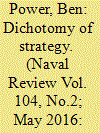

|
|
|
|
|
| Contents |
Part I - Origins of Russian and Soviet sea power
|
|
|
|
|
|
|
|
|
|
|
|
|
|
|
|
| 13 |
ID:
122513
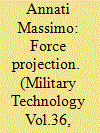

|
|
|
|
|
| Publication |
2012.
|
| Summary/Abstract |
Aircraft carriers have been considered, for long time, the long stick of major maritime powers, capable to project force ashore and themselves a proud symbol of naval power. Todaym only a few European countries operate a carrier force: France, Italy and Spain, while the UK with a shocking decision, withdrew all the embarked fixed wing aircraft and terminated a long and proud tradition.
|
|
|
|
|
|
|
|
|
|
|
|
|
|
|
|
| 14 |
ID:
123485
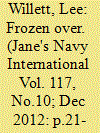

|
|
|
| 15 |
ID:
133067
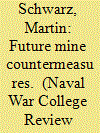

|
|
|
|
|
| Publication |
2014.
|
| Summary/Abstract |
Admiral Smith's point might be as valid today as it was sixty-four years ago. It refers to mines that he faced off the coast of Korea. Naval (or sea) mines are, by themselves or in combination with other weapons, a promising choice to parties pursuing antiaccess/area-denial objectives. The number of mines in the stocks of countries around the world and the ease of laying them mean that sea control is very likely to be lost again in future tension and conflict. This article is an attempt to describe the means, and to some extent the methods, under consideration to win it back if the need arises again. Mines pose a threat not only to military use of the sea but also to civilian shipping. The global economy depends on secure access to the global commons. With roughly 95 percent of world trade being shipped by sea, it is clear how much the economy depends on open trade routes and sea areas.1 Therefore, the capability to counter mine threats is needed to provide freedom of movement not only to one's own and friendly naval forces but to merchant shipping as well.
|
|
|
|
|
|
|
|
|
|
|
|
|
|
|
|
| 16 |
ID:
133062
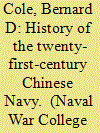

|
|
|
|
|
| Publication |
2014.
|
| Summary/Abstract |
China historically has been a continental rather than a maritime power, despite its more than eleven thousand miles of coastline and more than six thousand islands. It has more often viewed the sea as a potential invasion route for foreign aggressors rather than as a medium for achieving national goals, a tendency that has contributed to the weakness of the Chinese maritime tradition. This attitude had changed by the beginning of the twenty-first century. The remarkable growth of China's economy beginning in the last two decades of the twentieth century, the broadening of Beijing's global political and economic interests, and resolution of almost all border disputes with its many contiguous neighbors have contributed to increased attention to threats to the vital sea lines of communication (SLO Cs) on which China increasingly depends.
|
|
|
|
|
|
|
|
|
|
|
|
|
|
|
|
| 17 |
ID:
146363
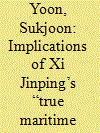

|
|
|
|
|
| Summary/Abstract |
Xi Jinping’s declaration that China should strive to become a “true maritime power” (海洋强國) has been much discussed in the context of China’s “peaceful rise” (和平崛起) and the pursuit of the “Chinese dream” (中国夢). 1 Although there is, at face value, nothing quite new about Xi’s exhortation to the Chinese leadership, his remarks need to be understood against a rather complex background of situations, policies, and aspirations if their full significance is to be appreciated.
|
|
|
|
|
|
|
|
|
|
|
|
|
|
|
|
| 18 |
ID:
147982
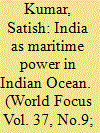

|
|
|
|
|
| Summary/Abstract |
India has inherited British regime, but failed to catch up some of the structures which were laid out by the regime. Independent India did not imagine of a strong naval base in Indian Ocean. The look east policy did initiate importance of Indian Ocean but remained confined to economic trade and commerce, the strategic insight remained missing. The current regime did start it innings with a strong dose of security and strategic concerns under the banner of Indian foreign policy. Three major thoughts were intertwined.
|
|
|
|
|
|
|
|
|
|
|
|
|
|
|
|
| 19 |
ID:
073421
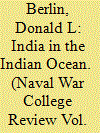

|
|
|
| 20 |
ID:
092235
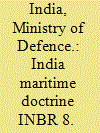

|
|
|
|
|
| Publication |
New Delhi, Ministry of Defence, Gov. of India, 2009.
|
| Description |
xii, 174p.
|
| Contents |
B
|
|
|
|
|
|
|
|
|
|
|
|
Copies: C:1/I:0,R:0,Q:0
Circulation
| Accession# | Call# | Current Location | Status | Policy | Location |
| 054606 | 359.00954/IND 054606 | Main | On Shelf | General | |
|
|
|
|
|
|
|
|
|